
Community Members Confirm Progress
After disruptive heavy rains in January 2021, communities planted vegetable gardens that were immediately affected by excessive heat, But the farmers persisted in their efforts and by the end of June, gardens were producing lettuce, cabbage, carrots, beets, onions, parsley, tomatoes, and sweet peppers.
Women showed enthusiasm for the work in the gardens. Cristina says, “We planted the vegetable gardens and built fences that prevented animals from entering. We feel a lot of joy at having kitchen gardens near the house.”
Important to the success of this work is respect for women’s and indigenous rights. Mariana said, “Before, we women used to go to community meetings, but we did not participate, we only listened. Now we mention our rights, our problems and our way of seeing things. We learned that this is the place to speak, to make a change.”
Nutrition workshops highlighted the importance of a good diet and the dangers of poor nutrition. Participants studied the nutritional properties of traditional foods extracted from the forest as well as those they now grow. They also learned about good hygiene for food preparation and preservation.
Estelvina says, “We received seeds, and they showed us how we should plant and transplant when the time comes. The well also helps a lot so that we can irrigate what we plant. In the food course, we saw some ways to make better use of what we had in the garden. We are very happy because we can eat delicious vegetables every day without spending money.”
Another highlight was the success of the 2020-2021 beekeeping season, when the 100 beekeepers sold approximately 8,000 quarts of honey. Their objective for next season is to increase production by 40%.
Tito, a beekeeper, says, “We have greatly improved the quantity and quality of our honey. Honey sales mean we can buy food, clothes, and other things we need. With the money from last year’s honey sales, I bought two beekeeping boxes for my daughter, and another member of the community did the same, so we are improving. We learned a lot from the technicians, and we have new ways to improve production that will help us sell the honey at a higher price.”
Paraguay Lower Chaco Program
Led by Church World Service and Local Partner Pastoral Social de Benjamín Aceval & Comité de Iglesias (CIPAE)
